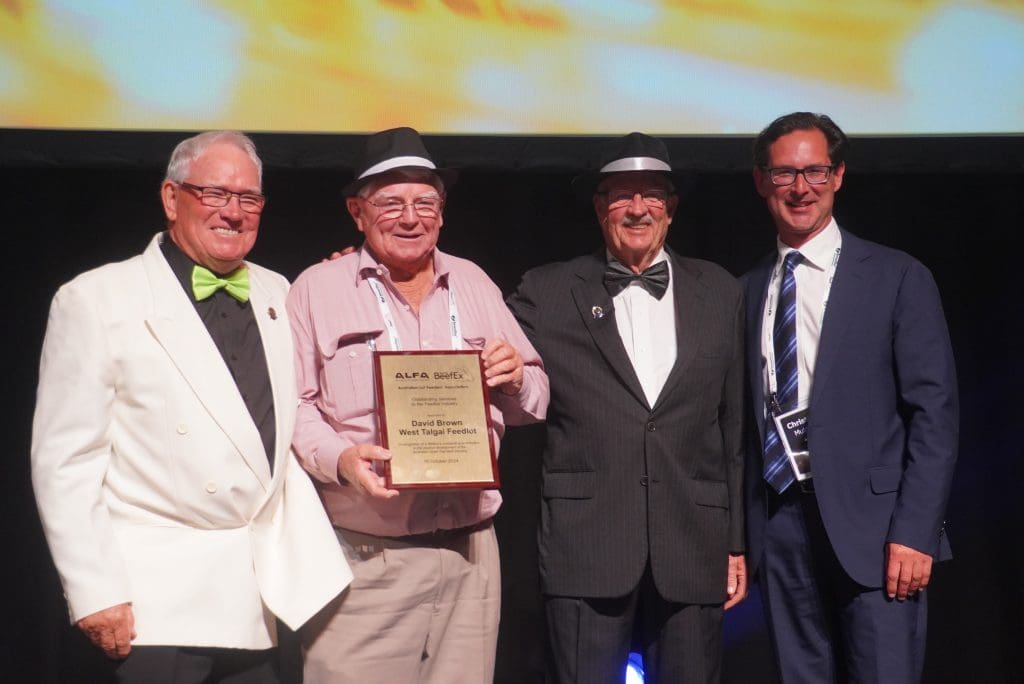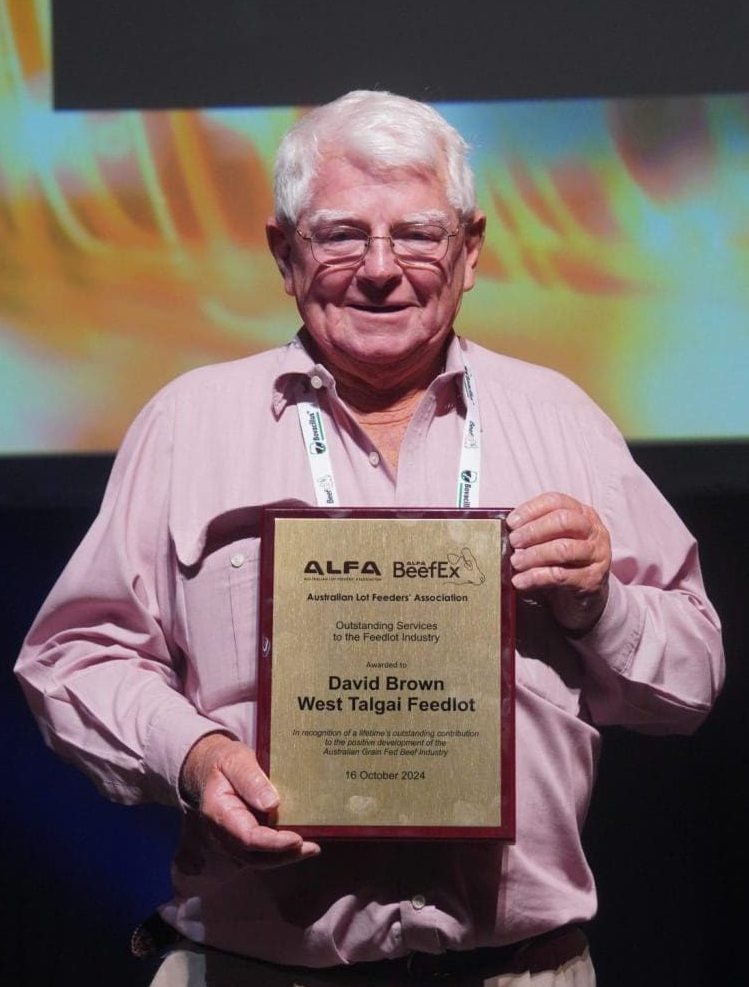
David Brown receives his Outstanding Services award from industry stalwarts Kev Roberts, left, and Malcolm Foster, along with ALFA chief executive Christian Mulders. Fancy dress code for the BeefEx dinner explains the hats
THE grainfed beef industry inducted a rare Outstanding Industry Service award winner during the BeefEx conference this week, with Darling Downs lotfeeder and veterinarian David Brown being saluted for his 30 year contribution to industry affairs.
Dr Brown has owned and operated the West Talgai feedlot near Allora for the past 40 years, including a long term Woolworths supply contact, providing a perspective from the smaller lotfeeders’ viewpoint. Earlier in his life he was a practising cattle vet, including lengthy stints in the Northern Territory in TB testing.
With his technical training as a veterinarian, Dr Brown has brought a unique perspective in his key industry-facing role in helping guide grainged industry research and development.
Awarded only occasionally over the past 20 years, ALFA’s Outstanding Services award is reserved for individuals who have made longstanding valuable contributions to the current and future betterment of the Australian feedlot industry.
Previous recipients have included Robin Hart from Kerwee feedlot, Kev Roberts from Sandalwood, Malcolm Foster from Rangers Valley, Bill James from Performance Feeds, Tony Hoey from Advanced Animal Nutrition, Peter Watts from FSA Consulting, and Des Rinehart from Lilyvale feedlot and MLA grainfed R&D program manager.
 Industry stalwarts Kev Roberts and Malcolm Foster presented the honour David Brown this week. Mr Brown’s significant contributions to the feedlot industry’s development and sustainability throughout the years were evident through their comments.
Industry stalwarts Kev Roberts and Malcolm Foster presented the honour David Brown this week. Mr Brown’s significant contributions to the feedlot industry’s development and sustainability throughout the years were evident through their comments.
“David has been involved in the ALFA Research & Development committee for more than 20 years. Along with his veterinary science background and owning and operating his own feedlot for the past 40 years, he is well renown as a successful businessman outside of the feedlot industry, with few lot feeders being able to match his scientific and practical experience,” the pair said.
“He always offered constructive, informed and valuable input into the many roles he played around the selection and management of R&D projects of benefit to the feedlot industry,” Malcolm Foster said.
“He always raised issues of particular concern to the smaller end of the feedlot industry, wherever that was relevenant. He has actively contributing to our industry for almost 30 years. He has, and continues to play a significant role in ensuring that our industry can grow further in a profitable and sustainable way.”
“The Australian beef industry would not be where it is today without David Brown’s contribution, Kev Roberts said.
ALFA president Barb Madden said Dr Brown’s contributions and dedication to the industry over the years had been nothing short of remarkable.
“His work has helped shape the lotfeeding sector into what it is today, and as an industry we are grateful for his unwavering commitment.”
In accepting his award, Dr Brown said the Australian grainfed industry’s National Feedlot Accreditation Scheme was second to none in terms of industry driven QA programs in the world – and our grainfed research & development program had put us equal to, if not better than anywhere else in the world.
“I can’t tell you how proud I am to have been involved in that program,” he said.
Innovation, adoption
Despite the smaller scale of his lotfeeding business, Dr Brown has been an early adopter of innovation, especially in the area of carbon abatement, installing six 30-watt solar panels, introducing feed additives, changing to submersible pumps and measuring whole-of-feedlot carbon output as part of a project through Ruminati and Woolworths.
“Everything is metered,” he said. “We used to have a 250hp tractor doing six tonnes of feed in the mixing box. We now have a 150hp tractor doing nine tonnes, through better and more efficient mixing boxes,” he said.
Avian influenza biosecurity risk
As a veterinarian, one of his current livestock biosecurity concerns is the risk of a virulent form of Avian influenza entering Australia, he told Beef Central during a BeefEx discussion.
The United States has now recorded Avian Influenza virus type A (H5N1) in 300 dairy herds in 14 US states including California, Colorado, Idaho, Michigan, Texas, Iowa, Minnesota, New Mexico, South Dakota, Kansas, Oklahoma, North Carolina, Ohio, and Wyoming.
“Ultimately, to be the only country in the world that doesn’t have it rings alarm bells,” he said.
“The fact that we have transient migratory birds coming in from the north puts us at at risk. And the Queensland government recently sent all vets a tech note alerting them to look for certain symptoms attached to AI.”
“And feedlots inevitably harbour native birdlife, given the abundant supply of grain, water and shelter, adding to the risk of introduction,” Dr Brown said.
He said he did not know enough about the topic to comment on the state and federal government’s current response to to the AI biosecurity risk, but was simply alerting people that this was something all industry stakeholders needed to put a ‘watching brief’ on, because it is ‘likely to bite us.’
“We’ve already seen what it’s done to the cost of eggs, but I’m concerned about what happens if it gets into the cattle industries, and intensive animal production (as in the US dairy industry) represented an elevated risk.”
Podcast:
Some time back, David Brown sat down for an interview with Kerry Lonergan as part of Beef Central’s Weekly Grill podcast series. Click here to access.
